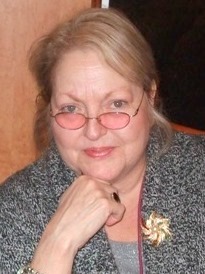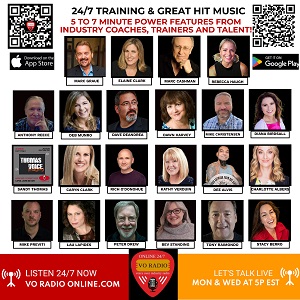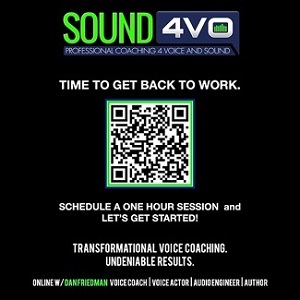|
Career: Move On From Your Past &
Believe In Yourself As A Voice Actor
By Bettye Zoller
Voice Actor and Coach
Voicesvoices.com
 I’ve never met anyone who had planned for a career as a voice-over professional - who announced, at age four that: I’ve never met anyone who had planned for a career as a voice-over professional - who announced, at age four that:
Oh no. Voice-overs are usually an afterthought, the result of a career change or perhaps an auxiliary occupation meant to earn additional money over and above one’s regular job.
GRATEFUL FOR VO WORK
Some new voice talents come from working in theatre, television, singing, or dancing. Others come to voice-over work after being a nurse, a lawyer, a business owner, an insurance salesperson, a teacher.
Well, sometimes it’s best to put your past behind you! Often, an actor with stars in his eyes blithely announces that he will absolutely never stoop so low as to voice a commercial. He is a film actor. He is a dedicated student of film. He is a “serious” actor.
It takes but a few years for that person, head hung low, to seek gainful employment. He becomes grateful for the income voice-overs provide. After all, voice-overs paid for acting lessons, headshots, travel, wardrobe, promotion and publicity, and put food on the table.
And while the so-called “serious actor” may continue his quest for film roles while accepting voice-over jobs too - while he may even become a star (or at least more than an extra or a minor supporting player in films) - he’s probably going to "change his tune" and start to speak glowingly of his voice-over employment because they saved his tail feathers and paid the bills.
Whatever your past, it's time to start believing in yourself as a voice actor. And with that aim in mind, here are some important career tips ...
MAKE SEVERAL DEMOS
It’s well known that in Hollywood and New York, it’s best to have more than one resume and headshot when seeking various types of on-camera work.
Casting directors, producers, and agents want a “film resume” and a “film headshot” along with a “commercial resume” and a “commercial headshot.”
Traditionally, the “film headshot” is more serious, a more penetrating gaze, a more dramatic look, while the “commercial headshot” is generally friendly, smiling, happy, natural.
The resume versions are separated (for those with enough working credits). Thus, the casting director or producer sees only the actor’s credits in commercials, not films, or vice-versa.
The same theory holds for CD demos: Many in the business believe that a voice actor should have more than one CD demo.
In LA and NYC, it’s often suggested to present only a narration demo when seeing narration work, and a commercial voice demo when seeking a commercial voice job. The resume shows only work of one or the other type, not both.
DROP "DEMO" WORD
And while we’re on the subject: I suggest dropping the word “demo” - which often implies "newcomer" - from the cover and label of your CD. I prefer something like this: “John Jones, Voiceovers." Remove the word “demo” from your print materials and your vocabulary!
People who hear your voice-over CD will judge you (and it) on voice quality, usually without asking if the spots and narration excerpts on it are made up or real.
WHO'S TALKING?
Also be careful whose advice you accept regarding your voice-over demo.
Who are these people you’re speaking with? What are their credentials and experience levels?
Could they perhaps be envious of you or jealous, apt to want to discourage you? Do they have a selfish interest such as making money by telling you to let them redo your demo? This is a common scenario, sad to say, in our business.
Be cautious about soliciting opinions as to the worth of your demo, too. After you’ve put your trust in your demo producer (I presume you checked him or her out thoroughly, got referrals, listened to products), you should then have the confidence to put your demo “out there.”
But remember: one demo, particularly a first demo effort, won’t last more than about 18 months before it is time to redo it or, at least, change it up somewhat. You should be better by that time. Your next demo will be too.
DON'T BE SHY
I know people who have spent years without marketing themselves. Instead, they redo a demo constantly, ever-seeking another version.
I believe this is hiding from the world. Fear of failure. Does a dancer avoid public performances because she’s only been a dancer four years? Does a doctor refuse to accept patients because he’s been out of school only two years?
So you’re new … so be it!
When meeting producers, when networking, stay away from conversations dwelling on other occupations you’ve had, or on how new you are to the business. Instead, talk about how you’re progressing in your voice-over career.
Also be a good listener. Ask questions. Learn new things from others. You’ll find that these people have come to voice-overs from another career, too!
KNOW THE FIELD
Act like a professional. Act as if you know the field.
For instance, if a plumber came to fix your plumbing in your home and announced that this was his first job, would you be pleased? I doubt it. If the plumber is wise, he will simply tackle the repair job and complete it successfully without telling you of his newness.
Physicians graduate from medical school and after an internship set up a medical practice. They do not dwell on their inexperience.
To the contrary, in their starched white coat, with professional demeanor, they accept patients and start practicing. (It’s always bothered me that it’s called “medical practice.” I don’t want a doctor “practicing on me!”)
VOICE-OVER ONLY
When I first entered the voice-over field, I did so after attaining post graduate degrees in music and theatre, after teaching at a university, and after a seven year successful career on the road as a major headliner, a singer actor in musicals and cabarets, hotels and resorts, and as an RCA recording artist and songwriter.
But no one cared about any of this! Instead, they asked:
I soon learned to stop talking about my entertainment background and my degrees and training. With the help of a local voice-over coach, I obtained my first voice-over demo - a cassette tape and a reel-to-reel version of it too (remember those?). It wasn’t very good, but I set about getting voice-over work.
PAST LIFE: GONE
There are many who don’t even know of my “first career” in show business.
I began as a contract player at Metro Goldwyn Mayer studios in Hollywood at age five! They don’t know I am a trained pianist and violinist/violist. They don’t know of my work with RCA or as a songwriter. They don’t know of my career in writing and journalism. They know me as a voice talent (voiceovers and studio singing).
That’s fine with me. That’s who I am today. My past life is gone.
MANY ARE CHANGING CAREERS
My hairdresser, my friend for over 10 years now, is graduating from college and entering law school next fall. My pharmacist is going back to college to become a licensed physical therapist.
One of my voice-over students just returned from a tour of duty in Iraq. Several of my students are entering the voice-over field after long careers in other areas.
Voice-over knows no age and is a wonderful occupation at every age, but it's particularly attractive to the over-50 set. While doors are shutting elsewhere, voice-overs beckon.
HOW PEOPLE CHANGE
There is a book you might ask your librarian to obtain for you. It’s called, The Boys in White Coats. The book talks of identities and how people change as they attain new knowledge.
Medical schools are very aware of the difficulty of students entering a field where harming or even killing a person is quite real. Students are taught ways to assume the new identity of a doctor. They are taught ways to start believing in themselves as a medical professional.
The transition from student to pro is seldom easy in any field.
So start believing in yourself. Stop being timid and unsure and doubting yourself.
Instead, assume your new identity as a voice-over professional while continuing to work on your skills to improve yourself. And good luck!
Bettye Zoller, owner of the VoicesVoices educational and audio recording company, is one of the U.S.'s best-known voice, speech, acting, and voice-over coaches, and is a winner of ADDY, Clio, Golden Radio and Audie Awards. She holds advanced degrees from three universities, has served on university faculties for 30 years, and currently is the Feagin Artist Guest Professor at Tulsa University, presenting workshops in Houston sponsored by Women in Film and Television. Her home is Dallas but she teaches, by invitation, worldwide. She is a professional audio engineer/producer and is a Simon & Schuster audiobook author and reader.
Email: btzol@aol.com
Web: www.voicesvoices.com
|
|
|
Tell Us What YOU Think!
Please Note: Since we check for spam, there will be a slight delay in the actual posting of your comment.
Comments
No comments have been posted yet. Hurry, and you could be the first!

.png)







click for new article alerts